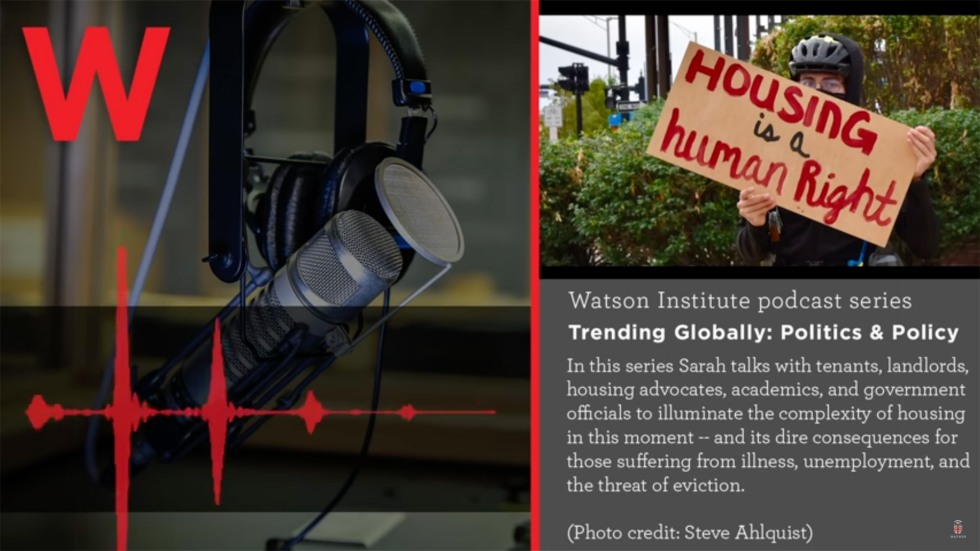But for COVID-19, "Less to Lean On," a special series on the Watson Institute’s Trending Globally podcast, might never have come to pass. The host of Trending Globally, Sarah Baldwin, Associate Director Steven Bloomfield, and several alumni and students worked for months to organize an April screening of “Providence Lost,” a documentary featuring one local family’s eviction, to be followed by a panel discussion on housing insecurity and homelessness. When COVID-19 shut everything down, Baldwin suggested transforming the students’ research and activism into a podcast series.
“I don’t think any of us realized what we were saying ‘yes’ to. It took on a life of its own,” Baldwin explained. “Housing is fundamental. If and how we are housed can affect the outcome of almost everything else in our lives, from education to employment to basic health.” The experience has stretched Baldwin, who typically researches her podcasts solo. COVID’s likely impact on local housing-insecure individuals and institutional racism related to housing policies and practices were addressed in the first two episodes. Later episodes will feature Kettia, a working mother of two who never expected to experience eviction, and institutional actors, including Brown, that continue to have an impact on neighborhoods and housing. The final episode will explore possible policy solutions.
As an undergraduate, Oscar d’Angeac ’17 (Urban Studies), was involved in HOPE (Housing Opportunities for People Everywhere), a Brown University student-run organization based at the Swearer Center for Public Service that addresses structural issues around housing and homelessness in Rhode Island. He is a co-founder of Signs of Providence, a nonprofit media collective confronting the state’s housing crisis. Through collaborating with other housing activists – whom he calls “tremendous” – d’Angeac met the family whose story he tells in "Providence Lost."
Like d’Angeac, Nathaniel Pettit ’20 (Public Policy) recognized that undergraduates can have a real impact when they work alongside community partners. “One of the best forms of student activism is research that amplifies community voices and helps expand community partners’ capacity,” Pettit noted. His thesis, A Home for the Liberal Ideal, charts the history of Brown’s expansion of off-campus housing (1937-97) and how such housing policies displaced many working class individuals and people of color in nearby neighborhoods.
“The coalition of housing advocates in Rhode Island exists as a result of government’s absolute failure,” asserted d’Angeac. “Insufficient housing, inadequate funding, and no centralized state agency overseeing housing has led to decades-long waiting lists for affordable housing.”
“While Brown students bring so many resources to Providence, they also can impose a housing burden that changes the makeup of surrounding communities by driving up rents in nearby housing stock,” stated Pettit.
Unlike many European countries, the United States doesn’t consider shelter a human right, and the pandemic has brought the issue of housing insecurity to the forefront. “This series,” advised Bloomfield, “exposes our nation’s racialized and shameful history of deliberate actions, both public and private, that have produced rampant housing inequality. It reminds us all how and why those without privilege suffer, especially in the context of the pandemic and the Black Lives Matter movement.”
"Less to Lean On" introduces listeners to compelling information:
- “Between 1934 and 1968, 98% of the loans approved by the federal government went to white applicants,” reported Baldwin.
- Marijoan Bull, a former adjunct professor of urban studies at Brown and author of Housing in America, said: “It’s just the greatest irony that so many folks … live in subsidized housing [due to mortgage interest deductions] while only 25% of the people who qualify for housing aid actually receive it.”
- “Every year in the U.S., 3.6 million evictions are filed.” Baldwin said. “In Rhode Island in 2018, more than 8,000 evictions were filed, 2,600 of them in Providence alone, a city of fewer than 200,000 people.”
- “There were days when I didn’t want … to be a burden. I slept in my car at truck stops,” said Kettia, now no longer homeless. “If I made $19 an hour, they was just like, ‘Oh, we can’t help you with housing,’ or ‘You make too much money.’”
Baldwin, Bloomfield, Pettit, and d’Angeac, producer of the series, along with other students and recent alumni, collaborate in weekly Zoom sessions to research, write and edit podcast content: Dhruv Singh ’20 (International Relations), Gabriel Mernoff ’22 (Public Policy); Lucas Fried ’21 (Public Policy and Economics), and Amelia Anthony ’22 (English). Trey Greer, Homes RI communications manager, lends his expertise, while Dan Richards, Watson’s audio production specialist, and Jackson Cantrell ’18 provide technical production assistance. “These students, many of whom are actively engaged with HOPE, are working assiduously and cultivating important relationships in the urban sphere, and are leading a creative effort to get the word out about social injustice,” remarked Bloomfield. “This series and the students’ activism fulfill Watson’s mission of peace and justice.”
“Brown students engaged in advocacy efforts, including these housing initiatives, are morally outraged by what they see around them,” said Tony Levitas, who directs the Watson’s Undergraduate Policy program. “They are turning that outrage into serious scholarship and activism. And they are figuring out ways to ensure that the work of one cohort is passed onto the next, so that succeeding generations don't have to reinvent the wheel.”
“Telling these stories of housing insecurity and homelessness is an act of social justice,” Pettit noted. “The severity of this problem in Rhode Island and across the nation is huge. We only see the tip of the iceberg.”
